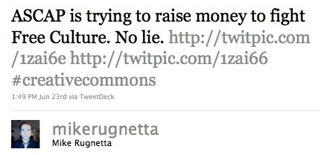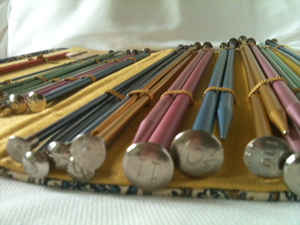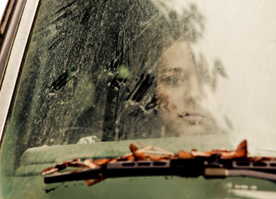Mind the Gap: June 2010 Archives
Nostalgia is a collective memory, apparently. Annual visits home now always remind me to check in on the awesome work of composer and fellow-Ohioan Brian Harnetty. I'm a fan.
This then also usually leads me pretty quickly back to my stash of Bonnie "Prince" Billy records, and albums like The Letting Go with string arrangements courtesy of--can it truly be?--Nico Muhly.
Yes, forget six degrees. The world is a very crazy game of Twister, and we are all pretty much touching at this point.
 Wow, I asked for your thoughts and you responded. A lot of amazing dialog has emerged here on Mind the Gap re: that ASCAP VS EFF PK CC BY-NC-SA fundraising letter in particular and the state of copyright in the digital age in general. If I were a member of Congress, perhaps I would have a catchy name for this battle of the acronyms by now, but as commenter Blik pointed out about halfway through, "The problem is there really is no secret war and now you just pissed off the internet."
Wow, I asked for your thoughts and you responded. A lot of amazing dialog has emerged here on Mind the Gap re: that ASCAP VS EFF PK CC BY-NC-SA fundraising letter in particular and the state of copyright in the digital age in general. If I were a member of Congress, perhaps I would have a catchy name for this battle of the acronyms by now, but as commenter Blik pointed out about halfway through, "The problem is there really is no secret war and now you just pissed off the internet."
Indeed, we welcomed a number of first-time visitors over the weekend, thanks to Twitter and Facebook mentions, and links from sources such as:
Slashdot: Creative Commons Responds To ASCAP Letter
Wired: ASCAP Assails Free-Culture, Digital-Rights Groups
In addition to the 50-some comments contributed to the Mind the Gap post, hundreds of comments went up on those sites, demonstrating just how personally important these issues are to readers coming at them from many creative specialties. The discussions provided some really interesting insight into how people, particularly those working in the fields of music and technology, are currently thinking about copyright, creativity, and economics.
For my part, the conversation has only strengthened my perception of how insanely confused people are about how the current system is even supposed to function. As Mike Rugnetta, the author of that original tweet, pointed out in a follow up: "If Ive learned 1 thing from this ASCAP situation its that NO ONE - including those who get PRO checks - understands how rights mgmt works...Myself included; I have NO idea. Obviously this is a very broken system." Even the authors of the letter that touched off all this debate seemed not to fully understand or were distorting the positions of the organizations they were calling out as hostile (as Marc Weidenbaum noted, "My gosh, it's like suing the freaking Quakers. All CC does is offer an alternate approach -- and the two aren't even incompatible.").
Hopefully all the conversation here and elsewhere will ultimately help advance positive change in the field as to how we share, protect, and support our intellectual work in the digital age. The entire comment chain is well worth your time for the myriad perspectives shared, but Gurdonark perhaps put it most eloquently:
I favor a copyright system, and the ability for artists, musicians and writers (and other creative folks) to earn royalties. Yet one can keep a strong copyright system, and still encourage liberal licensing and a vibrant public domain. When folks argue that nobody will fund creative projects absent a copyright system, that raises the strawman that everyone wishes to abolish copyright. To the contrary, many of us wish to preserve copyright, and to merely make it more workable in the modern age.
 This post is in part motivated by the fact that "Google's YouTube just annihilated Viacom in federal court," but I've been meaning to link to this piece by Christina Mulligan which explains--using big round numbers--what the fictional students on the hit show Glee would actually be on the hook for if they wanted to perform their mash-ups and upload their video remakes from an actual high school in Ohio. It's an issue that apparently has never even been mentioned on the show; no inspiring Will Schuester lecture about life and doing the right thing has ever even grazed the word copyright. I can't say this is much of a surprise: Legalese can be a downer, even with a show-tune backing track.
This post is in part motivated by the fact that "Google's YouTube just annihilated Viacom in federal court," but I've been meaning to link to this piece by Christina Mulligan which explains--using big round numbers--what the fictional students on the hit show Glee would actually be on the hook for if they wanted to perform their mash-ups and upload their video remakes from an actual high school in Ohio. It's an issue that apparently has never even been mentioned on the show; no inspiring Will Schuester lecture about life and doing the right thing has ever even grazed the word copyright. I can't say this is much of a surprise: Legalese can be a downer, even with a show-tune backing track.
Mulligan's larger conclusion about the current state of copyright in America is this:
Defenders of modern copyright law will argue Congress has struck "the right balance" between copyright holders' interests and the public good. They'll suggest the current law is an appropriate compromise among interest groups. But by claiming the law strikes "the right balance," what they're really saying is that the Glee kids deserve to be on the losing side of a lawsuit. Does that sound like the right balance to you?
I was also reminded of Mulligan's comments when Twitter lit up today after composer Mike Rugnetta received a solicitation for funding support from ASCAP for their Legislative Fund for the Arts. He posted the missive in two parts (1, 2). I have to say I was quite surprised by the list of organizations ASCAP called out in the letter. Creative Commons, Public Knowledge, and the Electronic Frontier Foundation have always impressed me with their policy positions. I read on one discussion board that if I had ever received a royalty check from a PRO, I would be less quick to cheerlead for anything that could potentially erode copyright. So any card-carrying, royalty-check-cashing peeps out there want let us know how they feel?
UPDATE: Lawrence Lessig of Creative Commons responds to ASCAP.
 If you, like me, are actually not attending a national performing arts convention this week, you can still consume an inspirational keynote address (while steering clear of certain conference dangers--kidding!) by checking out this archived copy of Ben Cameron's remarks to the members of the League of American Orchestras.
If you, like me, are actually not attending a national performing arts convention this week, you can still consume an inspirational keynote address (while steering clear of certain conference dangers--kidding!) by checking out this archived copy of Ben Cameron's remarks to the members of the League of American Orchestras.
Cameron is the smart/funny/charming program director at The Doris Duke Charitable Foundation, and here he hits so many great points square on the head it's dizzying. Sorry, there's no embeddable player, but if you go here and advance the player to the 48:40 mark, you can hear him get the crowd fired up. Totally worth a piece of your lunch hour, promise.
 After a couple weeks trying to think outside the box about the future of orchestral performance in America (without getting too ridiculous about it), I kinda couldn't take it any more. Was this just an exercise in futility? Was the case of the modern-day symphony just so screwed up that it could never be fixed? My psychic's line was busy, so I asked Google for a prognosis. Based on my highly unscientific analysis of search results for things that are dead, I feel that while it may be true that someone bludgeoned the orchestra with a candlestick in the library while no one was listening, such thinking might also just be a distraction from the real challenges facing these ensembles while adding drama to conversations at cocktail parties. As it turns out, lots of popular things are also dead. A sampling:
After a couple weeks trying to think outside the box about the future of orchestral performance in America (without getting too ridiculous about it), I kinda couldn't take it any more. Was this just an exercise in futility? Was the case of the modern-day symphony just so screwed up that it could never be fixed? My psychic's line was busy, so I asked Google for a prognosis. Based on my highly unscientific analysis of search results for things that are dead, I feel that while it may be true that someone bludgeoned the orchestra with a candlestick in the library while no one was listening, such thinking might also just be a distraction from the real challenges facing these ensembles while adding drama to conversations at cocktail parties. As it turns out, lots of popular things are also dead. A sampling:
Paul is dead.
God is dead.
Fun is dead.
Print is dead.
Ska is dead.
Blogging is dead (again).
Humor is dead.
Irony is dead.
"Authentic" is dead.
Privacy is dead.
Jazz is dead (commercially).
The internet is dead (as an investment).
Joking pushed aside a smidge, much of the conversation about the survival of the orchestra evolved hand-in-hand with chatter about its relevance to contemporary audiences. I was thinking about this when I saw the Green Day clip from the TONY awards: modern audience expectations and values, the appreciation for uniqueness of voice vs virtuosity, and um (love or hate the bravado required in the example above) stage presence. Even the Broadway performers as compared with the band were a striking illustration of the situation...no wonder people are confused/let down when 80 musicians of exceptional skill fail to deliver the whollop that five guys, some electrical appliances, and a sophisticated light board can generate in 30 seconds. I'm not talking about quality, I'm talking about the connection that has to happen first or the rest is neither here nor there. Can the orchestra get there while preserving its core mission/ideals? How?
Well, as we cruise into the grand finale of the orchestra r/evolution, the League is getting very American Idol about the festivities and is inviting the general public to steer the opening day conversations of the gathered orchestra administrators in Atlanta. Do your part to influence the future. Vote now.
Read the rest/share your thoughts with the r/evolution...
 Along with the death of classical, jazz, rock, hip hop, et al., is even crossover (or at least the critical angst surrounding it) dead? Maybe it's headed that way.
Along with the death of classical, jazz, rock, hip hop, et al., is even crossover (or at least the critical angst surrounding it) dead? Maybe it's headed that way.
Then again, maybe not.
Based on the interest Renée Fleming/Dark Hope is churning up, I'm thinking this patient is still breathing. But in a way, that's kind of the hook, right? More than anything, people are in a lather to find out what she actually sounds like when doing this new thing she's doing, whether whatever that turns out to be is any good or not. People want to listen actively and talk about what they hear. (My personal vote for most illuminating review so far: It didn't need to suck--and here's why.)
In this case, at least, it was actually a repertoire risk by a "classical institution" that, whatever you think of how it came off, got rewarded with lots of attention and passionate discussion. Something in there for the r/evolution perhaps...

 I've been reading Shannon Hayes's newish book Radical Homemakers: Reclaiming Domesticity from a Consumer Culture, and I'm really getting a lot out of the related thinking/reflection on lifestyle choices it inspires. Hayes interviewed quite a few people in rural-to-urban situations about how they are creating their lives (less spending, making doing) and the book includes many of their stories and a lot of interesting history about homemaking before the word became so loaded. It's both an inspiring and challenging read; highly recommend.
I've been reading Shannon Hayes's newish book Radical Homemakers: Reclaiming Domesticity from a Consumer Culture, and I'm really getting a lot out of the related thinking/reflection on lifestyle choices it inspires. Hayes interviewed quite a few people in rural-to-urban situations about how they are creating their lives (less spending, making doing) and the book includes many of their stories and a lot of interesting history about homemaking before the word became so loaded. It's both an inspiring and challenging read; highly recommend.
As a person deeply involved in creative fields, though ones more focused on paper and performance, I struggle to make space for the private, family-based creative acts that go into homemaking. However, even though such work often gets short shrift in contemporary society--spend more time at the office and let stops at Olive Garden and Target do the rest!--a homemade life is always where I find the most emotionally satisfying creative opportunities. But I'm also coming to understand that that's also where I can find equally intense intellectual satisfaction. Like anything, house work can be mindless (cleaning probably always kinda is), but it will be what you put into it. I'm not about to go freegan or anything, I don't think, but I am going to be on the lookout for a wider variety of home-based creative opportunities and see how it feels to shift a bit more of my creative focus from public pursuits to private ones.
I wonder if professional artists (in the big definition of artist sense) these days, faced with the pressures of time and opportunity and the siren song of their Facebook pages, feel the need to skip investing in their personal creative lives in order to put enough time into meeting their career aims. Is it an element out of balance? What impact might changing that up have on the lives and work of artists and the local communities they inhabit?

*Bread recipe from 101 Cookbooks. And who could say no to rainbow juice? (Clearly, I have no children.)
 Ah, the next long, hot summer begins. Even if you didn't BBQ anything or drive to the shore to celebrate the arrival of the season, a three-day time out from the usual topics is an important reminder of how powerful a thing a mental break can be. Sure, we need to think super creatively about the challenges facing our field, but we sometimes also think about them from the same exact angle for too long and get a little buried in the muck of the details, no?
Ah, the next long, hot summer begins. Even if you didn't BBQ anything or drive to the shore to celebrate the arrival of the season, a three-day time out from the usual topics is an important reminder of how powerful a thing a mental break can be. Sure, we need to think super creatively about the challenges facing our field, but we sometimes also think about them from the same exact angle for too long and get a little buried in the muck of the details, no?
We started playing with this idea over at the r/evolution before packing the car for the beach:
We often bring up the fact that there is so much entrenchment in the industry at this stage that the entire operation feels tied down like a captive of the Lilliputians. So, clean slate: no season, no building, no contracts, no critics, no subscribers. Take yourself, however it is that you are involved with your local orchestra, and imagine you woke up this morning and it wasn't there any more. If you wanted your town to have an orchestra next season, you would have to sit down at your kitchen table and build one. Would you build it? What would it look like? How would it function?
Now that we're on this side of our new sunburns, I wonder if anyone has any fresh perspectives to offer. One of the ideas I tossed into the pool was that the fine folks charged with steering the respective ocean liners of high culture out there might benefit from sit downs with all of their newest and youngest staff members in order to absorb some fresh thinking on what the organization does and how it might do it better. Taking that from the flip side, if you are the newer/younger hand on deck, what have you seen that makes you most shake your head about how business is (or maybe isn't) getting done?
